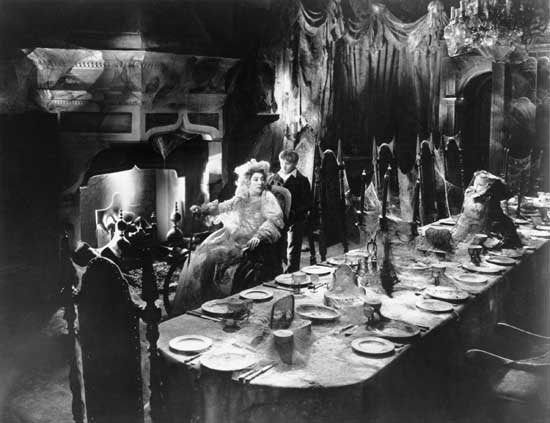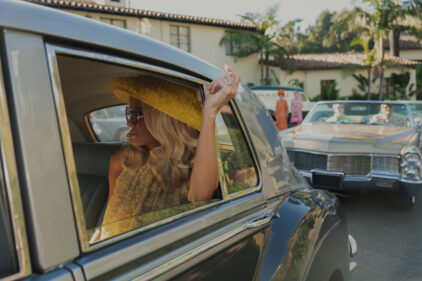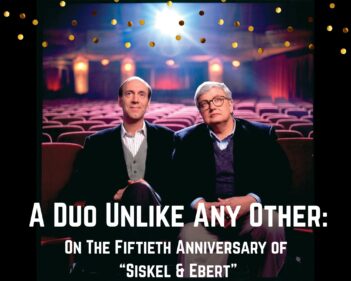
One of the great things about Charles Dickens is the way his people colonize your memory. I wonder if there’s any writer except Shakespeare who has created more characters whose names we remember, and whose types seem so true to human nature. A director adapting a Dickens novel finds that much of his work has been done for him.
Certainly that’s the case with David Lean’s “Great Expectations” (1946), which has been called the greatest of all the Dickens films, and which does what few movies based on great books can do: Creates pictures on the screen that do not clash with the images already existing in our minds. Lean brings Dickens’ classic set-pieces to life as if he’d been reading over our shoulder: Pip’s encounter with the convict Magwitch in the churchyard, Pip’s first meeting with the mad Miss Havisham, and the ghoulish atmosphere in the law offices of Mr. Jaggers, whose walls are decorated with the death masks of clients he has lost to the gallows.
British critic Adrian Turner has observed that “Great Expectations” resembles a horror film, and certainly there is horror and the macabre in the existence of Miss Havisham, who was jilted on her wedding day and has spent the rest of her life in bitter resentment–all of the clocks in her house stopped at the moment when she discovered that her fiance has betrayed her. Dickens (and Lean) have a chilling success with the early scene in which Pip, an orphan being raised in a blacksmith’s house, is summoned to the gothic mansion of a rich local woman and finds old Miss Havisham, still in her wedding dress, occupying the room where the wedding feast was to be held. She points out the “bride cake,” nibbled by mice, festooned by cobwebs, and requires Pip to push her wheelchair around and around the long table where the wedding feast had been planned.
The atmosphere of the mansion and its deranged occupant no doubt inspired Billy Wilder’s “Sunset Boulevard,” made four years later, with its aging movie queen in gloomy exile inside her mansion in Beverly Hills. Turner, who has written books on both Lean and Wilder, makes the comparison, and also wonders if the early graveyard scene of Magwitch jumping at Pip from outside the screen didn’t inspire countless imitations in horror films ever since.
In Miss Havisham’s mansion is the young Estella (Jean Simmons, astonishingly beautiful at 17). The old woman has adopted the girl, and brought her up for one purpose only: to break men’s hearts. Pip falls instantly in love with her, but Estella tries to warn him away, perhaps because she really likes him. Her purpose is to cause men pain, so that Miss Havisham can somehow settle her account with an unfair world. Pip, who has been reared by his shrewish older sister (Freda Jackson) and her husband, the good-hearted blacksmith Joe Gargery (Bernard Miles), is too rough-hewn for the elegant Estella, but a mysterious benefactor finances his transformation. Pip is summoned by Jaggers, Miss Havisham’s lawyer, and told that his expenses will be paid while he undergoes education and training in London–not least in how to dress and speak like a gentleman. He shares rooms with elegant young Herbert Pocket (Alec Guinness), who sets a fine example.
Of course Pip assumes that Miss Havisham is his benefactor, and that he is being groomed to marry Estella (played by Valerie Hobson as a 20-year-old). Whether he is right or wrong is one of the questions Dickens solves in his story’s melodramatic conclusion. The Lean version makes minor repairs on the ending to satisfy the sentimental requirements of audiences, which means that those familiar with the novel will not necessarily know how the film ends.
Since Dickens draws his characters in bold, colorful strokes, typecasting is probably the best approach to filling the roles. Pip himself is a somewhat colorless hero; like many of Dickens’ central characters, he’s not the source of the action but a witness to the colorful events and people that thrust themselves into his life. It’s the supporting cast that makes the story vivid.
Marita Hunt dominates the early scenes, playing Miss Havisham as a beak-nosed, shabby figure, bedecked in crumbling lace and linen, not undernourished despite her long exile; at times in profile she looks uncannily like a late bronze of Queen Victoria. Another fount of energy is the towering Francis L. Sullivan as Jaggers; his voice rolls and booms from a vast frame, and he dwarfs his eager little assistant Wemmick (Ivor Barnard). The scene in which Wemmick brings Pip home to meet his Aged Parent is typical of the appeal Dickens makes to our imaginations; there is no reason such a peripheral character as the “Aged P” needs to be preserved in a film version–but we remember how the Aged was deaf and loved to be nodded to, and a lot of amusing nodding goes on.
The only misstep in the casting may have been the choice of John Mills as the adult Pip. Mills was 38 when the film was made, and Pip is supposed to be 20 going on 21. It’s a jolt when the film cuts from young Pip (Anthony Wager), who is about 16, to the grown Pip, who is supposed to be only four years older but frankly looks middle-aged. (Guinness, who plays Pip’s contemporary Herbert Pocket, was 32; this was his first substantial screen role.)
The movie was made by Lean at the top of his early form; his “Brief Encounter” (1945), starring Trevor Howard and Celia Johnson in the story of a sad and touching romance, remains one of the great British classics. His “Blithe Spirit” was made the same year, and he went directly from “Great Expectations” to another Dickens adaptation, “Oliver Twist” (1948). He was an editor for seven years before directing his first film, and his career stands as an argument for the theory that editors make better directors than cinematographers do; the cinematographer is seduced by the look of a film, while the editor is faced with the task of making sense out of it as a story.
David Lean (1908-1991) was considered by many the greatest British filmmaker of his time, although a better case can be made for Michael Powell, for whom he worked as an editor (“49th Parallel,” 1941). He achieved his great fame with a series of epics beginning with “The Bridge on the River Kwai” (1957) and continuing with a series of monuments: “Lawrence of Arabia” (1962), “Doctor Zhivago” (1965), “Ryan’s Daughter” (1970) and, after a long sojourn with a doomed production of “Mutiny on the Bounty,” “A Passage to India” (1984). He won Oscars for directing “Kwai” and “Lawrence” and was nominated for five other films (including “Great Expectations”). The later pictures of course made Lean’s worldwide reputation. They show, as all of his films do, a fondness for dramatic visual compositions; he liked to arrange the elements in a frame to draw the eye to the dramatic center of the shot. What the earlier films have is greater economy, and thus greater energy, in their storytelling. The later Lean worked more like a former cinematographer than a former editor.
When the British Film Institute celebrated its 50th anniversary with a banquet at the Cannes Film Festival, Lean, Prince Charles and Princess Diana were the guests of honor, while his rivals, such as Lindsay Anderson and Alan Parker, sat in the cheap seats. But there were those who felt that his earlier, smaller films, like “Great Expectations,” were his best, and that the later pictures were weakened by a crisp perfectionism. I visited the set of “Ryan's Daughter” on the Dingle Peninsula of Ireland in 1969, and remember a night when Robert Mitchum held court in a rain-swept cottage. “Our director has filmed for one day,” he said, “and he is a week behind.”
Footnote: Alfonso Cuaron’s 1998 version of “Great Expectations” updated the story to a Florida mansion choked in vegetation, and starred Ethan Hawke as Pip, Gwyneth Paltrow as Estella and Anne Bancroft as Miss Havisham. It caught the same notes of horror and pathos, but got unfavorable reviews, perhaps because it was so willing to follow the story right over the top. I liked its nerve.



















